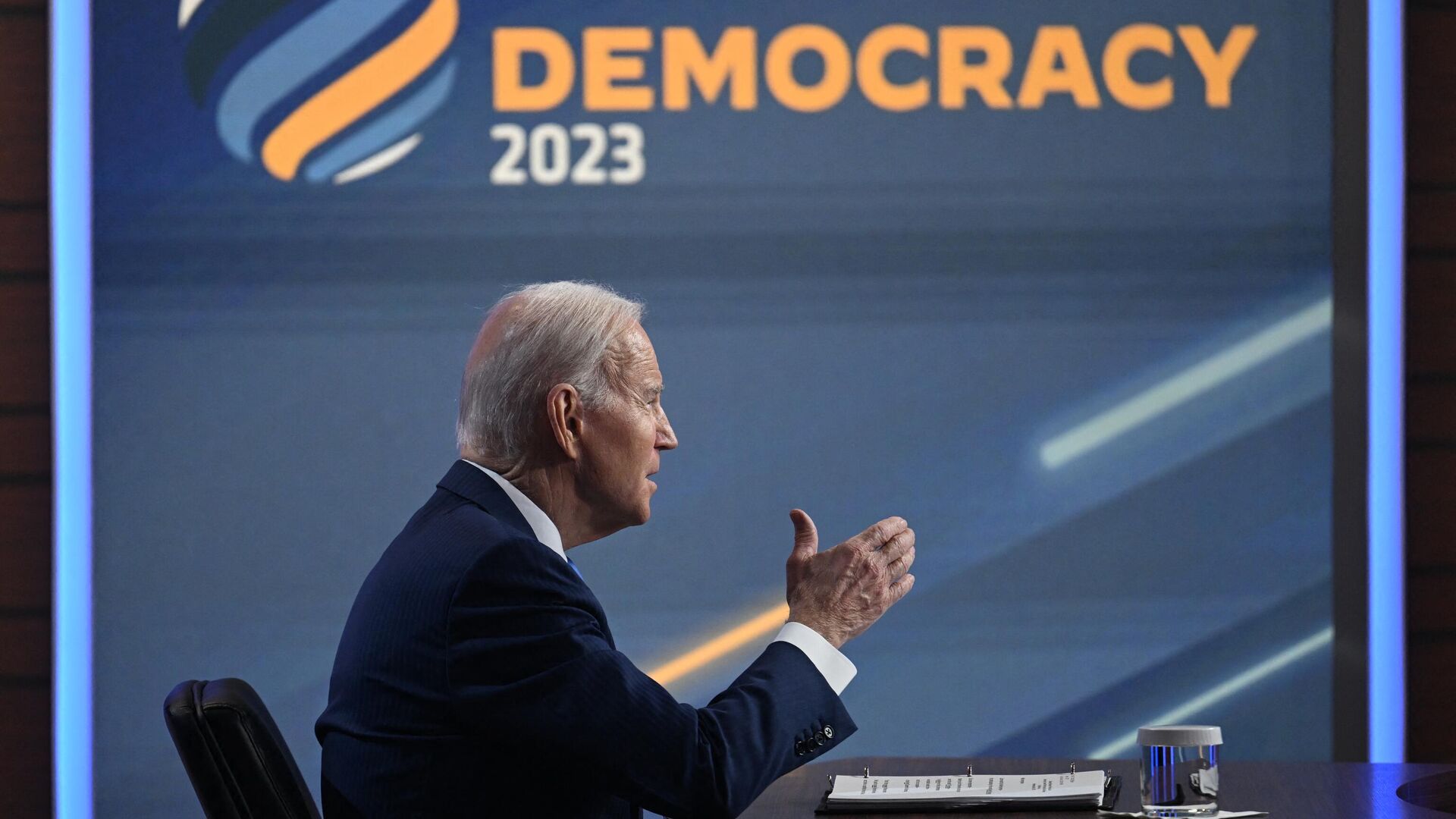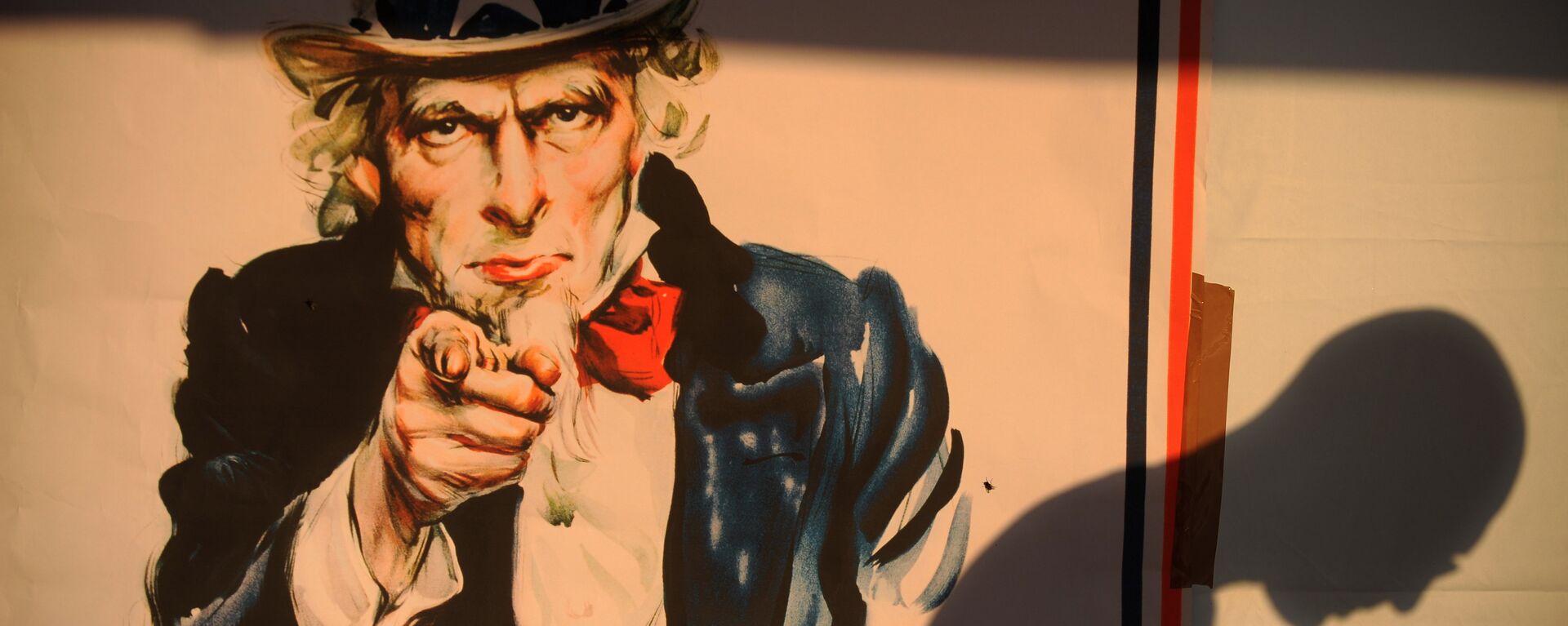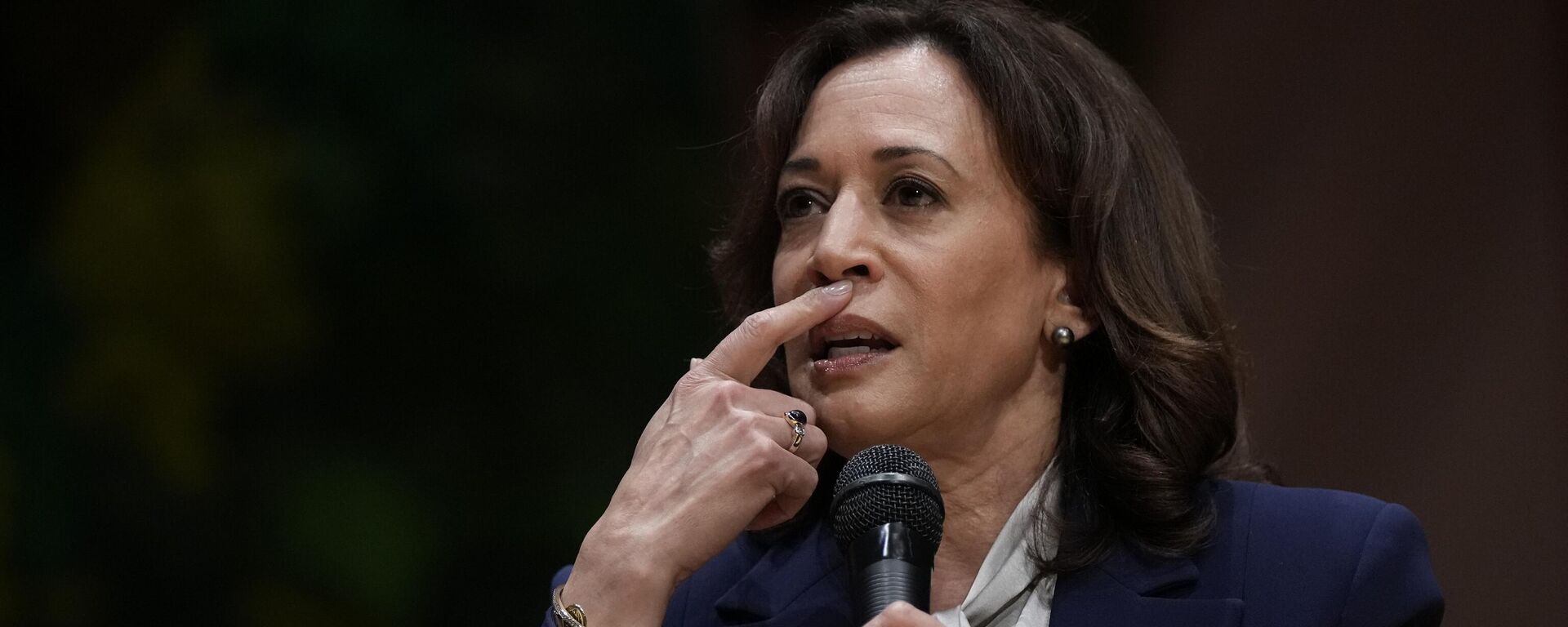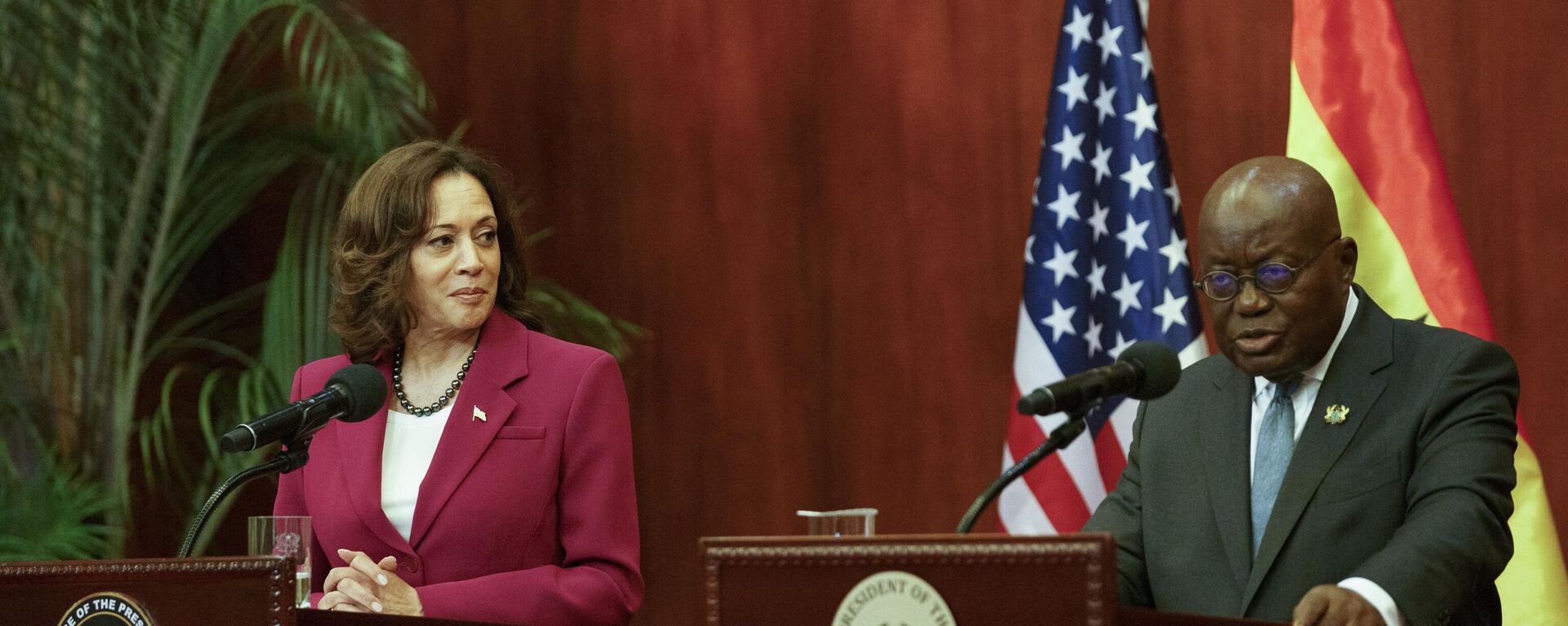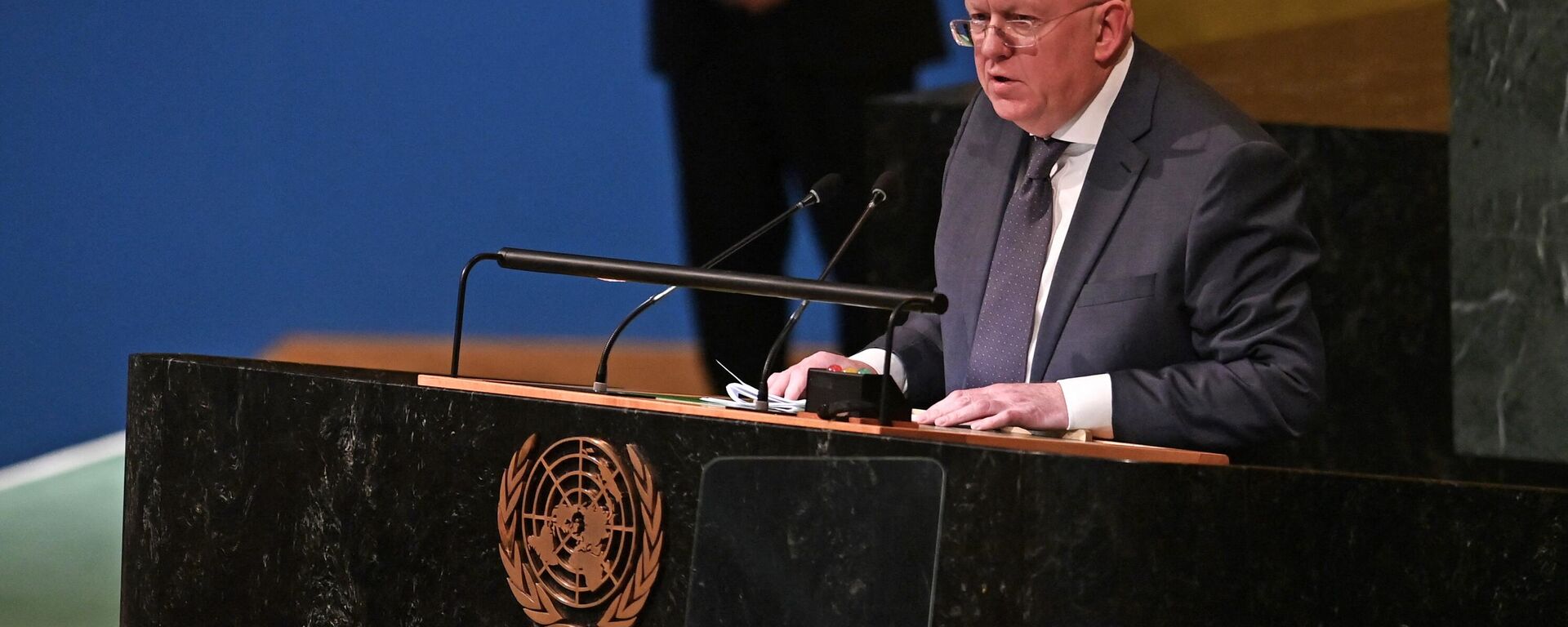https://sputnikglobe.com/20230331/us-run-democracy-summit-shows-that-africans-need-to-defend-their-interests-pundits-say-1108981701.html
US-Run Democracy Summit: Africans Need to Defend Their Interests, Pundits Say
US-Run Democracy Summit: Africans Need to Defend Their Interests, Pundits Say
Sputnik International
African states are in need to "protect their interests" and be in a position "where they can deal with all their partners" without choosing sides and favoring one partner over another amid the West's "hypocrisy", experts say.
2023-03-31T18:37+0000
2023-03-31T18:37+0000
2023-04-03T10:25+0000
africa
us
democracy
summit
political pundits
autocracy
autocrat
us hypocrisy
double standards
west
https://cdn1.img.sputnikglobe.com/img/07e7/03/1f/1108993859_0:267:3075:1997_1920x0_80_0_0_43cd06d26bbd9bb5e1267434d6e63050.jpg
African countries need to "protect their interests" and be in a position "where they can deal with all their partners" without choosing sides or favoring one partner over another amid the West's "double standards and hypocrisy", says Nigerian policy consultant Ovigwe Eguegu, commenting on the US-led Second Summit for Democracy.Led by the US administration and co-chaired by Zambia, Costa Rica, the Netherlands, and the Republic of Korea, the three-day summit ended in Washington on Thursday, with less than 50% of the participants endorsing it final declaration.The text of the summit's declaration included a wide range of political commitments that include protecting human rights, women’s rights, media freedom, and the rule of law, ensuring accountability for human rights violations and abuses, supporting free elections, democracy, combating corruption, addressing global challenges, including sustainable development, climate change, global health, and food security.The declaration was endorsed by only 73 countries out of the 120 participants, with 14 nations endorsing it with reservations or disassociation from its text. It also included two key commitments that are of importance for the US administration. According to the experts, these are supporting Ukraine in the wake of the ongoing Russian military operation there, and defending against foreign "malign influence" and foreign "information manipulation".Summit Intends to Promote 'US Version of Democracy'Despite the fact that the US-led declaration has recognized that "democracy can take many forms", and has called for combating foreign "malign influence", Eguegu, a policy adviser at consultancy Development Reimagined, specializing in geopolitics with particular reference to Africa in a changing Global Order, believes that Washington is insistent on the promotion of "its version of democracy".According to Scott Ritter, a former US Marine Corps intelligence officer, the US vision of "democracy" being promulgated by the Biden administration ignores this reality. What the Biden administration is seeking to do, he says, is to further the span of control of what it calls the "rules based international order", an unwritten "standard" imposed by the US in the aftermath of the World War II which, at one time, was seen as the necessary mechanism for which to oversee global post-conflict reconstruction efforts, but which eventually was used as a means for sustaining US economic, political, and military hegemony across the globe.Eguegu says that the summit was one of the US administration's tools to "insert an ideological component into the ongoing great power competition", arguing, "It's no longer the Cold War." Eguegu assumes the US is competing with China and Russia, who in contrast to Washington push "no ideology" in their relationship with countries around the world, including in Africa.As these countries "don't want to be seen as being antagonistic" to their international partners, the political analyst believes, they tend to show up for such ideological summits, and they "may fully endorse the outcome or declaration or endorse [it] with reservations to certain paragraphs."In the same vein, in February, Russia's Foreign Minister Sergey Lavrov assumed that the Summits for Democracy were designed to formulate the right of the so-called democracies to promote imaginary assistance to the peoples of "autocracies," bypassing the authorities of these countries.Dr. Aaron Ola Ogundiwin, Associate Professor of Political Science, Babcock University, Nigeria, points to the bright side of the summit, saying that it was a platform where participant governments could share their various experiences and insights about implementing democracy, supporting human rights, and combating corruption among other things listed in the summit's declared agenda.However, although acknowledging that the US might be one of the oldest democracies, the Nigerian professor argues that Washington is among those who lack the "moral right" to "preach" democracy to the African continent.Ola Ogundiwin criticizes the US for preaching and leading the conversation on liberal democracy for Africa without actually discussing how to be democrats. He assumes that Washington is promoting its own form of democracy without considering the unique needs and challenges of African countries.'You Cannot Eat Democracy'Eguegu fully agrees with the point of view expressed by Zambian President Hakainde Hichilema, a co-host of the second summit for democracy, in a recent article, in the title of which the African leader states, "You cannot eat democracy". The article was published on US media in the lead-up to the summit.The expert argues that the relationship between African countries and the US, a lot of times, "is all about rhetoric, human rights, democracy, freedom, values, so on and so forth." He further adds that it appears that Washington "is not listening" to the real needs of its counterparts on the continent.To further his point, Eguegu says that the summit's co-host Zambia, which did not support the paragraph of the declaration on "human rights", is currently in need of economic growth because of its issues with debt, and creating jobs for its young and growing population. He insists that democracy would "seem to be an empty promise" if there is "no follow through in terms of investment, in terms of how to help these countries to industrialize, [and] to create jobs."Speaking of human rights, it's worth noting that earlier this week, as US Vice President Kamala Harris was kicking off a seven-day trip to three African countries – Ghana, Tanzania, and Zambia, – during which she is expected to discuss American-African relations. Zambian politician Bowman Lusaka released a welcoming statement addressing the top US official with a warning over promoting gay rights.In Ghana also, VP Harris faced a backlash over her promotion of LGBTQ ideology, arguing that gay rights are a human rights issue. Ghanaian MP Samuel George said that the US vice president has no "moral right" to talk about human rights issues in the West Africa’s nation while there is gun violence in her home country, which he considers "one of the biggest abusers of human rights."Social work expert and political analyst Mickdad Uhuru believes that "there is no way" for a well-developed country such as the US to "force" African countries to adopt its capitalist ideology in running their nations. The Tanzanian expert says he agrees with the outcomes of last week's Second International Forum on Democracy in Beijing, China, that warned against imposing a "single formula or model" for democracy, saying that each country has its own political culture and national needs.With only eight African countries endorsing the second democracy summit declaration, Nigerian political scientist Eguegu says that the US is failing to promote democracy around the world, especially in Africa, because it doesn't have strong economic initiatives to partner with these countries. This has resulted in one of Washington's main rivals, China, taking the lead in terms of trade, affecting the attitude of African countries towards the US.Maintaining Non-Aligned Stance in Global Power PoliticsEguegu says that the West is now practicing "outstanding" hypocrisy that is "glaring for everyone to see" in regard to the Russian military operation in Ukraine. He argues: "We did not see this type of action or agitation for when we had the issue in Libya, or the US invasion of Iraq." The expert adds that "there was no pressure to host democracy summits" to condemn the US military invasions of the Middle Eastern nations.Not only that, but he notes there's also the question of Africans' interest and African countries trying to maintain a non-aligned stance in regard to global great power politics, emphasizing that "the situation in Ukraine is not necessarily seen as an isolated event."The expert suggests that trying to force countries to take sides in the Ukraine issue as part of a great power rivalry is not a wise decision, since it may lead to further tension between countries in the future.So African nations need to protect their interests, he says, and they need to be in a position where they can deal with all their partners "because African countries have economic security and development interests tied to the US as much as they have ties to China, they have ties to Russia as well."Dr. Frederick Golooba-Mutebi, an independent Ugandan researcher and Political Scientist with a special interest in Political Economy, believes that the recent US-led democracy summit was "very badly conceived" by Africans because of the US approach to Africa.Golooba-Mutebi suggests that the use of sanctions and repression in international relations creates a negative atmosphere that hinders true dialogue and politics. The political scientist believes that "it is too late" for the White House to try to use soft power after resorting to force, and Africa is tired of this approach.
https://sputnikglobe.com/20230329/the-us-is-not-a-democracy-1108886575.html
https://sputnikglobe.com/20230324/harris-on-africa-trip-to-raise-us-concerns-over-influence-of-china-russia-official-says-1108749556.html
https://sputnikglobe.com/20230328/kamala-harris-has-no-moral-right-to-talk-about-human-rights-in-ghana-local-mp-says-1108871122.html
https://sputnikglobe.com/20230331/developed-countries-morally-obliged-to-aid-africa-russias-un-envoy-says-1108981295.html
africa
west
Sputnik International
feedback@sputniknews.com
+74956456601
MIA „Rossiya Segodnya“
2023
Muhammad Nooh Osman
https://cdn1.img.sputnikglobe.com/img/07e4/08/0e/1080170965_2:0:2050:2048_100x100_80_0_0_1de8233c87df0979e7e74f61b6ffacad.jpg
Muhammad Nooh Osman
https://cdn1.img.sputnikglobe.com/img/07e4/08/0e/1080170965_2:0:2050:2048_100x100_80_0_0_1de8233c87df0979e7e74f61b6ffacad.jpg
News
en_EN
Sputnik International
feedback@sputniknews.com
+74956456601
MIA „Rossiya Segodnya“
Sputnik International
feedback@sputniknews.com
+74956456601
MIA „Rossiya Segodnya“
Muhammad Nooh Osman
https://cdn1.img.sputnikglobe.com/img/07e4/08/0e/1080170965_2:0:2050:2048_100x100_80_0_0_1de8233c87df0979e7e74f61b6ffacad.jpg
democracy, us, the united states, africa, what is a simple definition of democracy? , us democracy, democracy examples, democracy government, types of democracy, democracy definition simple, what is a simple definition of democracy?, us version of democracy, us vision on democracy, you cannot eat democracy, zambia, biden, kamala harris, ghana, malawi, botswana,
democracy, us, the united states, africa, what is a simple definition of democracy? , us democracy, democracy examples, democracy government, types of democracy, democracy definition simple, what is a simple definition of democracy?, us version of democracy, us vision on democracy, you cannot eat democracy, zambia, biden, kamala harris, ghana, malawi, botswana,
African countries need to "protect their interests" and be in a position "where they can deal with all their partners" without choosing sides or favoring one partner over another amid the West's "double standards and hypocrisy", says
Nigerian policy consultant Ovigwe Eguegu, commenting on the US-led
Second Summit for Democracy.
Led by the US administration and co-chaired by Zambia, Costa Rica, the Netherlands, and the Republic of Korea, the three-day summit ended in Washington on Thursday, with less than 50% of the participants endorsing it final declaration.
The text of the summit's declaration included a wide range of political commitments that include protecting human rights, women’s rights, media freedom, and the rule of law, ensuring accountability for human rights violations and abuses, supporting free elections, democracy, combating corruption, addressing global challenges, including sustainable development, climate change, global health, and food security.
The declaration
was endorsed by only 73 countries out of the 120 participants, with 14 nations endorsing it with reservations or disassociation from its text. It also included two key commitments that are of importance for the US administration. According to the experts, these are supporting Ukraine in the wake of the ongoing Russian military operation there, and defending against foreign "malign influence" and foreign "information manipulation".
"We demand that Russia immediately, completely, and unconditionally withdraw all of its military forces from the territory of Ukraine," the US-led declaration read.
Summit Intends to Promote 'US Version of Democracy'
Despite the fact that the US-led declaration has recognized that "democracy can take many forms", and has called for combating foreign "malign influence", Eguegu, a policy adviser at consultancy Development Reimagined, specializing in geopolitics with particular reference to Africa in a changing Global Order, believes that Washington is insistent on the promotion of "
its version of democracy".
According to
Scott Ritter, a former US Marine Corps intelligence officer, the US vision of "democracy" being promulgated by the Biden administration ignores this reality. What the Biden administration is seeking to do, he says, is to further the span of control of what it calls the "rules based international order
", an unwritten "standard" imposed by the US in the aftermath of the World War II which, at one time, was seen as the necessary mechanism for which to oversee global post-conflict reconstruction efforts, but which eventually was used as a means for sustaining US economic, political, and military hegemony across the globe.
Eguegu says that the summit was one of the US administration's tools to "insert an ideological component into the ongoing great power competition", arguing, "It's no longer the Cold War." Eguegu assumes the US is competing with China and Russia, who in contrast to Washington push "no ideology" in their relationship with countries around the world, including in Africa.
"We still have the US insistent on promotion of democracy, its version of democracy," states Eguegu. "And that for many countries is problematic because when you have these types of ideological components being promoted and that becomes part of entrenching a country's foreign policy, then it complicates their relationship with countries like China and Russia who are very important partners to them," he stressed.
As these countries "don't want to be seen as being antagonistic" to their international partners, the political analyst believes, they tend to show up for such ideological summits, and they "may fully endorse the outcome or declaration or endorse [it] with reservations to certain paragraphs."
"But I think, overall, it is Washington's effort to shore up influence and to play to its strengths, with regard to how it wants to build and develop partnerships with countries across the world as it goes into this great power competition with China and Russia," Eguegu says.
In the same vein, in February, Russia's Foreign Minister Sergey Lavrov assumed that the Summits for Democracy were designed to formulate the right of the so-called democracies to promote imaginary assistance to the peoples of "autocracies," bypassing the authorities of these countries.
"Presently, the 'revolutionary team' [of the West], which is convening the so-called summit of democracies, is striving, according to our data, to come up with a draft of some kind of decision that develops the philosophy of confrontation between 'democracies'; and 'autocracies'," Lavrov said at the time.
Dr. Aaron Ola Ogundiwin, Associate Professor of Political Science, Babcock University, Nigeria, points to the bright side of the summit, saying that it was a platform where participant governments could share their various experiences and insights about implementing democracy, supporting human rights, and combating corruption among other things listed in the summit's declared agenda.
However, although acknowledging that the US might be one of the oldest democracies, the Nigerian professor argues that Washington is among those who lack the "moral right" to "preach" democracy to the African continent.
"Even though the US did not colonize (...), as far as ideology is concerned and history, the United States of America and Great Britain, and Western European countries belong to the same ideological orientation. So they are partners in progress, preaching democracy, human rights and all that to us in Africa," he says.
Ola Ogundiwin criticizes the US for preaching and leading the conversation on liberal democracy for Africa without actually discussing how to be democrats. He assumes that Washington is promoting its own form of democracy without considering the unique needs and challenges of African countries.
'You Cannot Eat Democracy'
Eguegu fully agrees with the point of view expressed by Zambian President Hakainde Hichilema, a co-host of the second summit for democracy, in a recent article, in the title of which the African leader states, "You cannot eat democracy". The article was published on US media in the lead-up to the summit.
The expert argues that the relationship between African countries and the US, a lot of times, "is all about rhetoric, human rights, democracy, freedom, values, so on and so forth." He further adds that it appears that Washington "is not listening" to the real needs of its counterparts on the continent.
"Nobody is against democracy. I do not see any country in the world where people don't value freedoms, or value human rights and liberty and all of that," Eguegu suggests. "But overall, there are priority areas, and those priorities tend to shape all domestic and foreign policy. For African countries, right now, the priority is about economic development."
To further his point, Eguegu says that the summit's co-host Zambia, which did not support the paragraph of the declaration on "human rights", is currently in need of economic growth because of
its issues with debt, and creating jobs for its young and growing population.
He insists that democracy would "seem to be an empty promise" if there is "no follow through in terms of investment, in terms of how to help these countries to industrialize, [and] to create jobs."
"You may feel free, but like I have said on another occasion, yes, there are human rights, but what about the right to eat? That's what the Zambian president is also saying. You can't eat democracy," he states.
Speaking of human rights, it's worth noting that earlier this week, as US Vice President Kamala Harris was kicking off a seven-day trip to three African countries – Ghana, Tanzania, and Zambia, – during which she is expected to discuss American-African relations. Zambian politician Bowman Lusaka released a welcoming statement
addressing the top US official with a warning over promoting gay rights.
"Vice President Harris should be informed that she risks being arrested if she promotes gay rights whilst in Zambia like she did in Ghana, as it is a criminal offense to promote unnatural acts in our beautiful nation," the former Zambian Member of Parliament said in the statement.
In Ghana also, VP Harris faced a backlash over her promotion of LGBTQ ideology, arguing that gay rights are a human rights issue. Ghanaian MP Samuel George said that the US vice president has no "moral right" to talk about human rights issues in the West Africa’s nation while there is gun violence in her home country, which he considers "one of the biggest abusers of human rights."
Social work expert and political analyst Mickdad Uhuru believes that "there is no way" for a well-developed country such as the US to "force" African countries to adopt its capitalist ideology in running their nations. The Tanzanian expert says he agrees with the outcomes of last week's Second International Forum on Democracy in Beijing, China, that warned against imposing a "single formula or model" for democracy, saying that each country has its own political culture and national needs.
"We will have to consider the economic situation of African countries and do some comparison with where the Americans are. I really appreciate what has been said in Beijing that we really have to appreciate the diversity," says Dr. Uhuru.
With only eight African countries endorsing the second democracy summit declaration, Nigerian political scientist Eguegu says that the US is failing to promote democracy around the world, especially in Africa, because it doesn't have strong economic initiatives to partner with these countries. This has resulted in one of Washington's main rivals, China, taking the lead in terms of trade, affecting the attitude of African countries towards the US.
Maintaining Non-Aligned Stance in Global Power Politics
Eguegu says that the West is now practicing "outstanding" hypocrisy that is "glaring for everyone to see" in regard to the Russian military operation in Ukraine. He argues: "We did not see this type of action or agitation for when we had the issue in Libya, or the US invasion of Iraq." The expert adds that "there was no pressure to host democracy summits" to condemn the US military invasions of the Middle Eastern nations.
"In no way, did we hear that countries should form, should put in the G20 Agenda, as we saw in Bali last year, the issue of Iraq, the issue of Libya. So this is the kind of double standard and hypocrisy that is actually off-putting for many African countries," Eguegu believes. "Nobody sees this as truly genuine."
Not only that, but he notes there's also the
question of Africans' interest and African countries trying to maintain a non-aligned stance in regard to global great power politics, emphasizing that "the situation in Ukraine is not necessarily seen as an isolated event."
The expert suggests that trying to force countries to take sides in the Ukraine issue as part of a great power rivalry is not a wise decision, since it may lead to further tension between countries in the future.
So African nations need to protect their interests, he says, and they need to be in a position where they can deal with all their partners "because African countries have economic security and development interests tied to the US as much as they have ties to China, they have ties to Russia as well."
"So why put yourself in a position where you complicate your relationship with other countries or with one partner, just because you want to please one particular partner who actually has shown too much double standard, in regard to international law," the Nigerian scholar concludes.
Dr. Frederick Golooba-Mutebi, an independent Ugandan researcher and Political Scientist with a special interest in Political Economy, believes that the recent US-led democracy summit was "very badly conceived" by Africans because of the US approach to Africa.
"American politics in Africa are dominated by sanctions, not by dialogue, not by an open mind to share ideas, share political vision and share economical projects with Africa," he says. "The first thing America always does with Africans is to punish them, is to sanction them, is to threaten to make them permanently on their guard, because they fear that if they don't do what America wants, they will be punished."
Golooba-Mutebi suggests that the use of sanctions and repression in international relations creates a negative atmosphere that hinders true dialogue and politics. The political scientist believes that "it is too late" for the White House to try to use soft power after resorting to force, and Africa is tired of this approach.
"We need economic growth to ensure the needs of that population. So I think this is the only point where there is an acknowledgment between America and Africa. But on all the other points, what are the goals of that cooperation? Where are we going together?" he questions "Are we going in a model where Africa just gives natural resources and America gives debt and, from time to time, gives sanctions? Or are we going in a model where Africa will develop itself with technological transfers in more consensual international relations with America or not? I think, in fact, it is only in that point of economic growth, that there is no problem in the view of America and the view of Africa. But the goals of this cooperation are not the same," the expert concludes.
